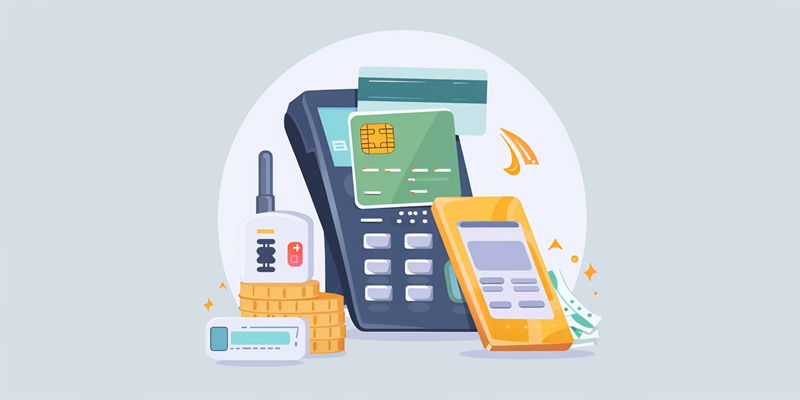The rise of the digital marketplace brings with it a surge in online transactions and an unfortunately parallel increase in cyber fraud. Experts anticipate that online payment fraud losses could hit a staggering $91 billion by 2028. In this precarious landscape, consumers must prioritize the security of their digital transactions. The threat of cybercriminals, constantly honing their techniques, means vigilance is paramount when it comes to protecting our digital wallets. This article offers practical guidance for consumers to safeguard their online payments, helping to maintain the integrity of their financial dealings in the face of increasing cyber threats. Implementing robust payment security measures is not just a suggestion—it’s a necessity for modern consumers navigating the digital marketplace.
Payment Method Analysis: Credit Cards vs. Debit Cards
When it comes to selecting payment methods for online purchases, the credit card reigns supreme in terms of security. Unlike debit cards, which offer direct and often unprotected access to one’s bank account, credit cards come equipped with a robust safety net. This defense mechanism features rigorous fraud detection systems and consumer protection policies, such as the ability to dispute unauthorized charges and possibly revoke them. The liability for fraudulent credit card transactions is typically limited, safeguarding users from severe financial loss.
In stark contrast, though debit cards are convenient and prevent overspending by limiting transactions to available funds, they do not always afford the same level of protection. The direct link to one’s bank account can prove to be a significant vulnerability, as unauthorized charges may result in immediate financial detriment. Recovering stolen funds from a debit account is often a more complicated and time-consuming process, with the potential for more severe impacts on the cardholder’s financial stability.
The Emergence of Alternative Payment Solutions
Virtual credit cards have surged as a reliable bulwark against online payment fraud, introducing an additional layer of security for digital purchases. Issuers of virtual cards generate unique card details for each transaction, severing the connection between the transaction and the consumer’s primary card information. This mechanism effectively restricts the potential for data breaches at merchant sites, as the disposable details become irrelevant once used.
Prepaid cards emerge as another strategic tool designed to combat the risks associated with online transactions. By predefining spending limits, consumers can directly control their financial exposure, as the funds on these cards are limited to the amount loaded. Prepaid cards offer a blend of flexibility and control, helping to cordon off personal finances from the frontlines of cyber fraud, and thus are especially appealing for those who are wary of overshooting budgets or revealing their primary banking details online.
Digital Wallets: A New Age of Secure Transactions
Digital wallets, including the likes of Apple Pay and Google Pay, herald a new age of transactional security. Through the power of encryption and tokenization, these services transform a user’s card data into a unique code for each transaction—significantly reducing the likelihood of card number theft. With multi-layered security protocols embedded within these technologies, digital wallets offer a shield against intruders, rendering sensitive information virtually impenetrable.
Yet, the security offered by a digital wallet is only as strong as the security of the physical device storing it. Users must be vigilant in ensuring their smartphones, tablets, or smartwatches are well-protected against unauthorized access. This translates into utilizing strong passwords, deploying biometric authentication, and keeping the device software up to date. Failure to secure the device could readily undermine the advanced security measures provided by digital wallets; thus, it is crucial to maintain both digital and physical safeguards concurrently.
Navigating the Minefield of Online Payment Scams
Online payment scams are a pervasive menace, with phishing attacks leading the charge. These scams deftly mimic legitimate communications, enticing the unsuspecting user to divulge sensitive information or to click on malicious links. The efficacy of these schemes is alarmingly high, making it paramount for users to be cautious and skeptical when dealing with online communications. By rigorously verifying the authenticity of emails, scrutinizing links, and eschewing unsolicited offers, consumers can greatly reduce their susceptibility to these fraudulent plots.
Additionally, educating oneself on the hallmarks of scams and keeping abreast of current deceptive practices contribute significantly to one’s defense arsenal. This empowerment through knowledge equips consumers to discern and ward off attempts at fraud, thereby preserving the integrity of their online financial transactions.
Solidifying Your Defense with Strong Cyber Hygiene Practices
In bolstering security against cyber threats, impeccable password practices stand as a cornerstone. The repetition of passwords across various platforms is a common blunder that opens multiple doors to attackers. Employing a password manager allows for the generation and custody of complex passwords, adequately fortifying accounts against brute force attacks and unauthorized access.
Software updates also play a pivotal role in maintaining cyber hygiene. These updates often patch security vulnerabilities and enhance protective features. Similarly, the implementation of reputable anti-virus and anti-malware solutions provides a proactive guard, neutralizing threats before they cause damage. Such measures are critical in constructing a resilient defense against a constantly evolving array of cyber threats.
Online Payment Best Practices
Executing online payments demands a secure environment; therefore, conducting transactions over public Wi-Fi is strongly discouraged. These networks are typically unsecured and can be easily compromised. Prior to entering any confidential information on websites, it is crucial to verify their security. This can be done by looking for the ‘https’ protocol and the padlock symbol in the address bar, ensuring that the data is transmitted over a secure, encrypted connection.
Consumers should adopt a vigilant mindset and a routine of thorough checks to safeguard their online transactions effectively. By heightening awareness and integrating layers of security measures, users can transform their online purchasing into a secure, controlled experience. The integration of these strategies will help establish a formidable barrier against the constantly looming specter of cyber fraud.

